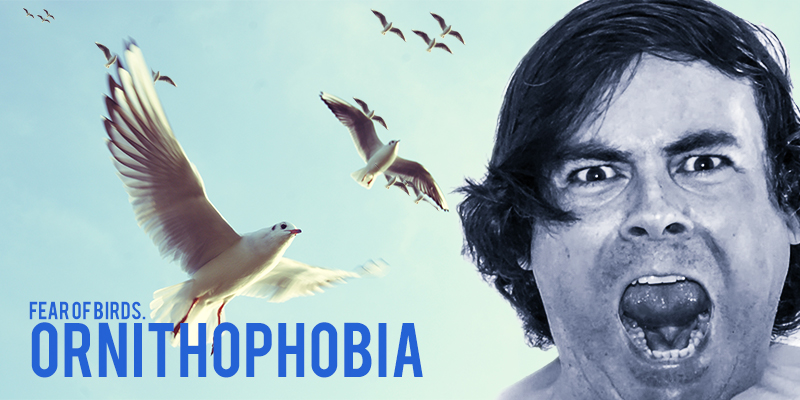Human beings can develop fear for almost anything. Ornithophobia is one such particular phobia where the person dreads birds extremely. It is signified by excessive discomfort and anxiety when the person is around birds, or anticipates to be faced with one. It has been derived from Greek word “Ornithos” meaning birds. The person gets intense fear and panicking when around birds, and feels that they might harm them in some way. An ornithophobic person may feel scared of notorious birds like vultures and eagles. Others may be scared of even domestic and harmless birds like parrots and pigeons.

What Causes Ornithophobia?
Different cause factors that can develop ornithophobia in people are:
A traumatic event
Ornithophobia can be associated with a previous traumatic experience where the person had been faced with threat and harm due to a bird. It can be attacks from birds like eagles and vultures, or getting pecked by birds during a zoo visit. It can be any such incident which can unexpectedly provoke fear. The fear can also develop if he/she has witnessed a loved one going through a harmful incident involving birds.
Media
Media can also play a strong contributing role in developing this kind of fear. There are movies like The Bird of 1963 in which Bodega Bay, CA gets attacked by wild birds extensively. These days, many internet flicks and TV programs also cover diverse news where birds have attacked humankind, and infuse the idea that birds can be dangerous.
Ancient beliefs
Different folklore and beliefs have been related with birds which present these aerial creatures as evil and harmful. There are beliefs about albatross being a messenger of bad luck or ravens being messenger of death and devastation. Extreme concentration on these kinds of superstition can also result a person to be ornithophobic.
Symptoms of Ornithophobia
A person might be facing this phobia mildly where he/she dreads only dangerous birds like vultures and hawks. On the other hand, some might be terrorized with even harmless birds like pigeons. The common symptoms that indicate ornithophobia in a person are:
- Severe and constant fear of birds
- Fear triggered by just a thought ,image or feathers of bird
- Avoiding any place with presence of birds such as a zoo
- Recognizing that the fear is unreasonable ( except in children)
- Panic attacks with physical signs such as trembling, sweating, racing heartbeat, muscle tension, dizziness or fainting, shouting, crying, getting fixed at the sight or running away hastily
When to Visit a Doctor?
If the above symptoms have been occurring for a time period of more than six months, and somehow affected your daily living, you need to consult with a doctor. Ornithophobia may not be much of a problem for someone fearing only large and harmful birds like vultures. It’s a problem when a person starts fearing even household and normally found birds like crows and pigeons. This can cause a remarkable distress and cause complete avoidance of the outside world. In such situation, treatment becomes necessary.
How is Ornithophobia treated?
Ornithophobia can be treated using various psychotherapies and medications. Some of the effective therapies used are:
Exposure Therapy and Relaxation
This is one of the very effective treatment methods used to treat ornithophobia. The therapist exposes fearful situation in front of the person through an image or a real bird. The person’s reactions are recorded and studied through regular exposure sessions. The therapist also teaches different relaxing ways such as mental visualizing and controlling breathing during exposures. Eventually, the person is able to have tolerance for the fearful subject.
Cognitive Behavioral Therapy (CBT)
CBT is aimed at modifying the negative thoughts and behavior of a person. The therapist has regular talk therapies and sharing sessions for the person to relive the inner negative thoughts related with birds. The therapist helps to build positive outlook towards the subject, and regain a normal life.
Medicines
Only in severe cases, medicines are used to control the anxiety. Commonly used medicines are anti-anxiety and anti- depressant medicines. They should be taken under strict prescription of a doctor only.